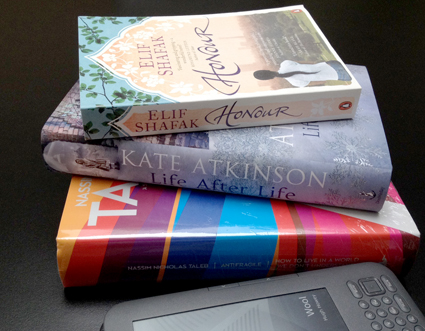Arthur C Clarke Award #1: ‘Nod’ by Adrian Barnes
I’m planning to read all the Arthur C Clarke Award shortlist this month and I’m kicking off with Nod by Adrian Barnes. In case you haven’t checked them out, here are the six contenders:
Nod by Adrian Barnes (Bluemoose)
Dark Eden by Chris Beckett (Corvus)
Angelmaker by Nick Harkaway (William Heinemann)
The Dog Stars by Peter Heller (Headline)
Intrusion by Ken MacLeod (Orbit)
2312 by Kim Stanley Robinson (Orbit)
Before I begin – Congratulations to all the authors!
‘Nod’ by Adrian Barnes
Nod is a post-apocalyptic novel set in Vancouver in the present day and takes the form of an 18-day journal written by Paul. He’s the academic type and he’s writing a manuscript about old words lost from modern everyday language. So the book has a philosophical turn reflecting the main character’s outlook.
Day 1: the city’s residents make their way to work and discover that virtually everyone everywhere has had a sleepless night; totally sleepless. Instantly the world divides into two unbalanced tribes – the ‘sleepers’ and the ‘awakened.’
Before the power supplies fail and the media channels go off-air, the world’s citizens learn that five sleepless nights will result in psychosis. Total body breakdown and death will follow within 32 days.
Paul is one of lucky few who can sleep and he describes the onset of psychosis in his girlfriend Tanya. Early in the novel they ‘adopt’ a lost child, Zoe. Like many children she is a sleeper, and speechless.
Amid the catastrophe, Paul becomes sucked into a power play between rival groups of sleep-deprived citizens. His manuscript, Nod, falls into the hands of Michael who hails Paul as the prophet of a new world order. Michael persuades hundreds of sleepless citizens to become his followers. Things go from bad to worse, as might be expected.
Paul decides to hide out until Michael and his followers die. He barricades himself into a tower block and starts his journal.
It’s a neat idea for a novel and brings to mind José Saramago’s Blindness in which the world’s citizens become blind except for a few people who bear witness to the madness that ensues.
My main niggle with Nod concerns the main character’s voice. Paul may be an analytical observer by nature but he simply isn’t as terrified as I’d expect, given the situation. I feel he comes across as emotionally detached and I’m not clear whether the author intended this. At worst, when Paul and Tanya have sex during Tanya’s pitiful decline into psychosis, Paul makes cold observations of his girlfriend that seem gratuitously cruel. I don’t know if the author wanted the reader to feel alienated by this section but it had that affect on me. Maybe Barnes wanted us to feel that humankind has sunk to the pits without any help from an apocalypse.
Don’t get me wrong. There’s some great writing in this novel if slightly uneven. And as I’ll be trying to justify my preference among the shortlisted novels I’ll add that the plot is meandering in parts. For example, why does Paul allow himself to be distracted from rescuing Zoe?
I know this book has been getting rave online reviews but I’m not convinced it’s the best of the 2012.
Next up: Dark Eden by Chris Beckett. I’m a fan of his earlier novel The Holy Machine so I’m looking forward to getting started.





